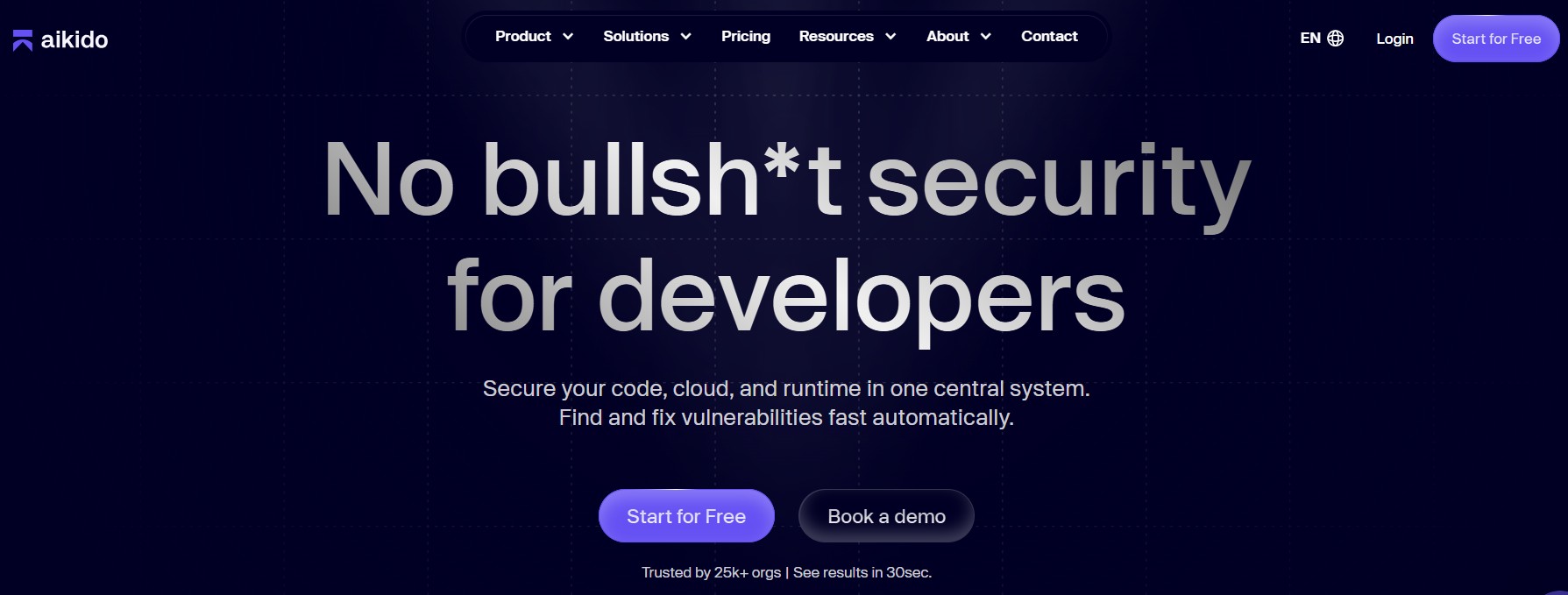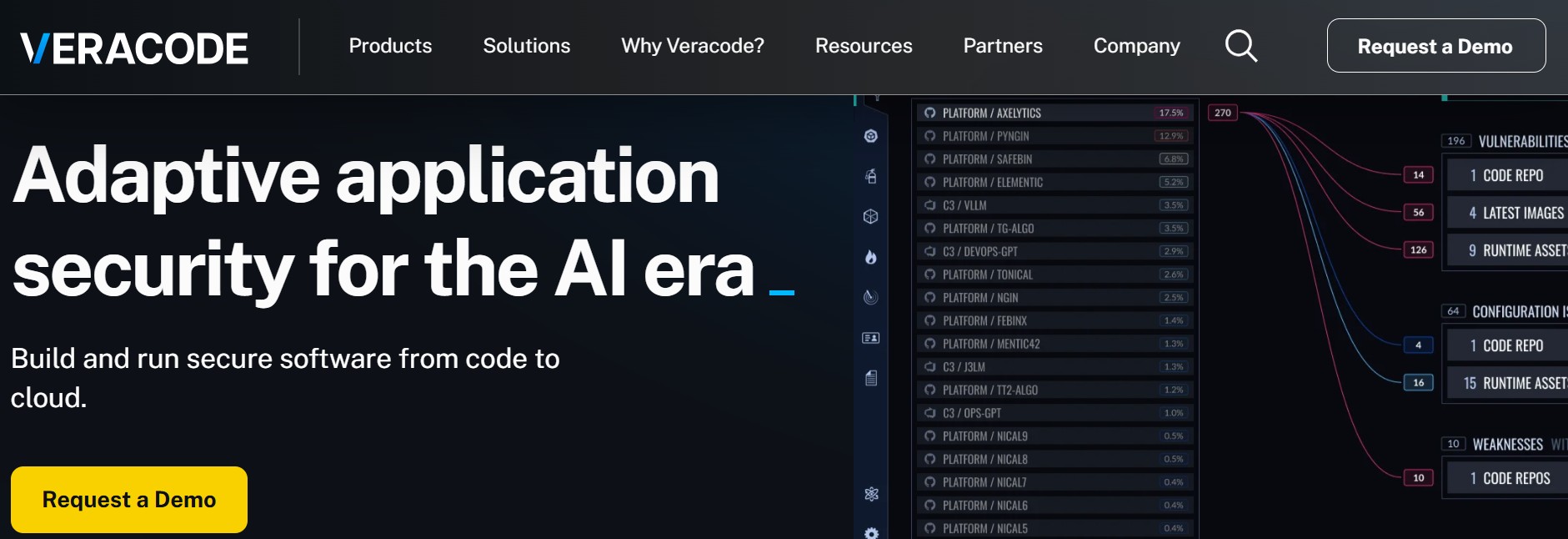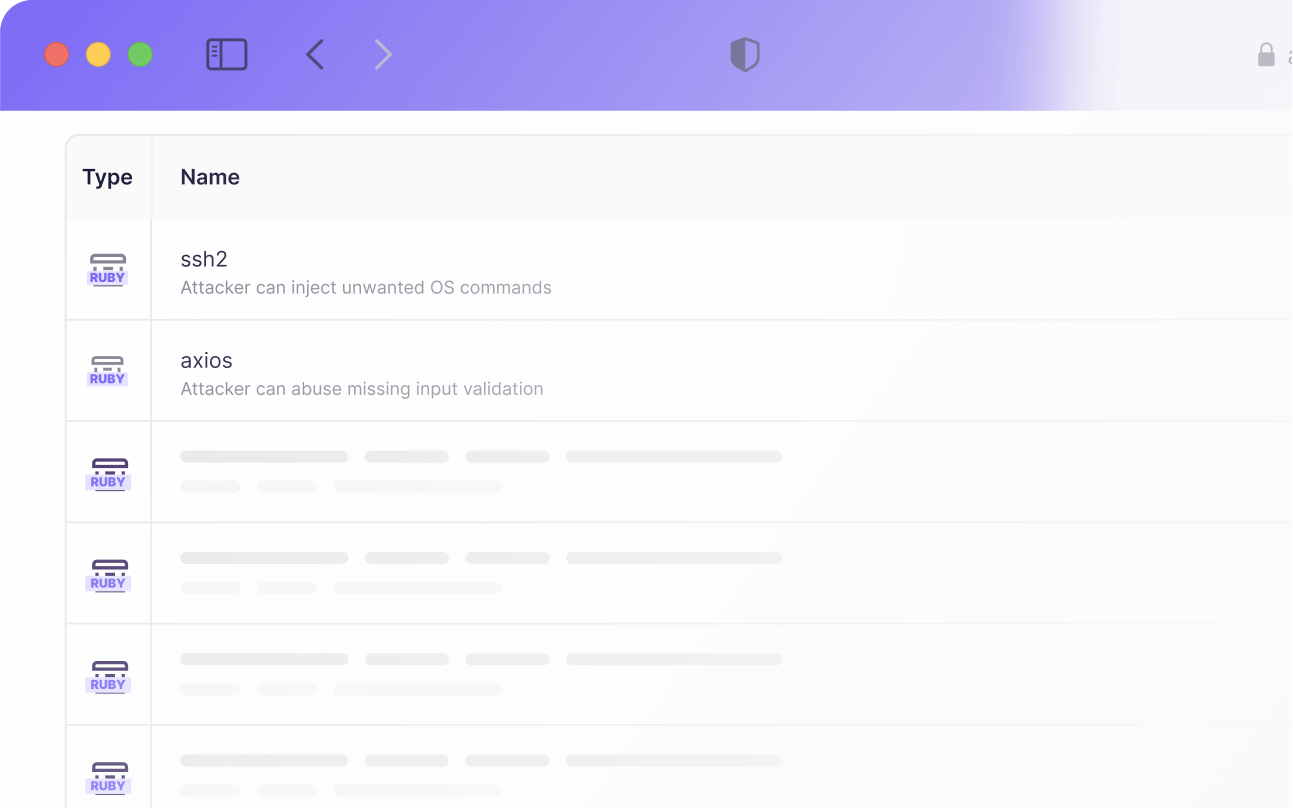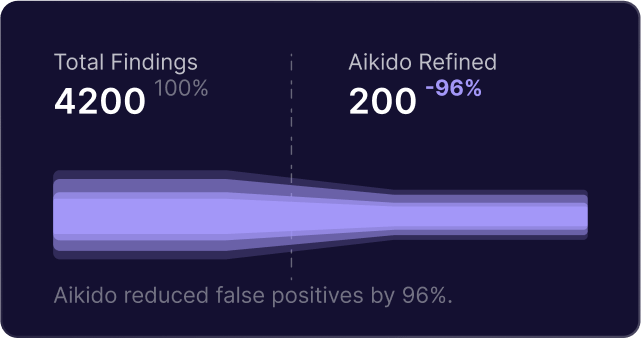Introducción
GitLab Ultimate es una popular plataforma todo en uno para DevOps que también incluye seguridad de aplicaciones integrada (AppSec). Ofrece control de código fuente, CI/CD y herramientas de seguridad integradas (como SAST y DAST) bajo un mismo techo. Este enfoque de extremo a extremo es potente, pero muchos equipos buscan ahora alternativas debido a problemas de usabilidad, coste, falsos positivos y una mala experiencia para el desarrollador.
TL;DR
Aikido Security ofrece una plataforma AppSec igualmente completa pero más optimizada como alternativa a GitLab Ultimate. Obtienes la gama completa de SAST, DAST, SCA, etc. en un solo lugar con muchos menos falsos positivos y una configuración más sencilla, y evitas la costosa licencia Ultimate de GitLab. Los precios fijos por usuario de Aikido y su diseño pensado para desarrolladores lo convierten en una opción más inteligente y rentable para los equipos de DevSecOps.
Los usuarios han informado que “para principiantes, su interfaz de usuario resulta compleja y recargada... y sus funciones premium son costosas”. Otros se quejan de los resultados de escaneo con mucho ruido; un desarrollador en Reddit señaló “falsos positivos flagrantes” (incluso “algunos corchetes se contaban como un secreto” por el escáner). Otro usuario dijo que “las funciones de seguridad básicas están detrás de un muro de pago irrazonable”, reflejando la frustración con los precios y el empaquetado de GitLab.
Si tienes poco tiempo, no dudes en saltar a las Principales alternativas a GitLab Ultimate para una visión general rápida de las herramientas. A continuación, se muestra una vista previa de las cinco alternativas que cubriremos:
- Aikido Security – Plataforma AppSec todo en uno pensada para desarrolladores (del código a la nube)
- ArmorCode – Gestión de la Postura de Seguridad de Aplicaciones para la agregación de herramientas y la gobernanza
- Snyk – Herramienta SCA y de seguridad de contenedores centrada en el desarrollador
- SpectralOps – Escáner de código ligero (secretos y configuraciones incorrectas)
- Veracode – Suite AppSec para empresas para SAST/DAST y más
Si estás reconsiderando la seguridad integrada de GitLab, echa un vistazo a nuestra lista de las mejores herramientas AppSec en 2025, una lista seleccionada de plataformas diseñadas para proteger tu SDLC.
¿Qué es GitLab Ultimate?
- Plataforma DevSecOps de primer nivel: GitLab Ultimate es el nivel de pago más alto de GitLab, que combina la gestión del código fuente, CI/CD y capacidades de seguridad en una sola plataforma.
- Escáneres de seguridad integrados: Ultimate incluye escáneres integrados para Pruebas de seguridad de aplicaciones estáticas (SAST), Pruebas de seguridad de aplicaciones dinámicas (DAST), análisis de dependencias (SCA), escaneo de imágenes de contenedores, detección de secretos y más.
- Paneles de seguridad y gestión: Proporciona informes de vulnerabilidades y paneles donde los equipos de seguridad pueden revisar los hallazgos y aplicar políticas.
- Dirigido a: Empresas y equipos regulados que necesitan integrar controles de seguridad en sus pipelines de CI/CD y buscan cumplimiento normativo preconfigurado.
¿Por qué buscar alternativas?
Los equipos consideran alternativas a GitLab Ultimate cuando se encuentran con estos puntos débiles en sus características de seguridad:
- Interfaz sobrecargada y escaneos lentos
- Falsos positivos en los escaneos
- Visibilidad limitada en tiempo de ejecución – GitLab carece de una gestión integrada de la postura de seguridad en la nube o de observabilidad en tiempo de ejecución.
- Precios confusos y poco transparentes
- No prioriza al desarrollador – carece de una integración real en el flujo de trabajo del desarrollador o de remediación en línea.
Criterios clave para elegir una alternativa
Al evaluar alternativas a GitLab Ultimate centradas en AppSec, priorice lo siguiente:
- Experiencia del desarrollador – plugins para IDE, remediación clara de problemas, UX intuitiva
- Resultados rápidos y precisos – Evite la fatiga por alertas de escáneres ruidosos
- Amplitud de cobertura – Soporte para SAST, DAST, IaC, SCA, secretos y seguridad de contenedores
- Integración CI/CD – Funciona con su pipeline, no en su contra
- Precios transparentes – Planes predecibles, sin laberintos de ventas
Tabla comparativa
Principales alternativas a GitLab Ultimate
Basándonos en las necesidades anteriores, aquí tienes cinco de las mejores alternativas a GitLab Ultimate para la seguridad de aplicaciones:
- Aikido Security – Plataforma AppSec todo en uno, developer-first
- ArmorCode – Orquestación unificada de AppSec (agregación y gobernanza)
- Snyk – SCA y seguridad de contenedores centrados en el desarrollador
- SpectralOps – Escáner de código ligero para secretos y configuraciones erróneas
- Veracode – Suite AppSec de nivel empresarial (SAST, DAST, etc.)
Aikido Security

Resumen: Aikido Security es una plataforma pensada para desarrolladores que ofrece una solución todo en uno para la seguridad de aplicaciones, cubriendo desde el código hasta la nube. Combina múltiples escáneres y herramientas bajo un único panel de control, incluyendo análisis estático de código, análisis de dependencias de código abierto, comprobaciones de contenedores e Infraestructura como Código (IaC), pruebas de API, análisis de configuración de la nube y mucho más. La capacidad destacada de Aikido es su énfasis en la precisión y la automatización: utiliza IA para reducir los falsos positivos e incluso ofrece correcciones con un clic para ciertos problemas a través de su función de corrección automática con IA.
Características clave:
- Escaneo unificado – Una única plataforma para SAST, DAST, SCA, detección de secretos, escaneo de contenedores y de la nube, etc.
- Correcciones asistidas por IA – Remediación automatizada mediante sugerencias impulsadas por IA, incluyendo solicitudes de fusión.
- Integraciones amigables para desarrolladores – Conexiones profundas con pipelines CI/CD, IDEs, Slack y plataformas Git.
Por qué elegirlo: Si tu equipo está frustrado con el ruido o la complejidad de GitLab Ultimate, Aikido es una excelente opción. Es ideal para equipos que buscan una cobertura de AppSec integral pero con una experiencia más sencilla y centrada en el desarrollador. Te beneficiarás de muchos menos falsos positivos, un triaje más rápido y más automatización desde el código hasta la nube. También ofrece un modelo de precios transparente y una versión gratuita, lo que facilita probarlo sin compromiso.
ArmorCode

Resumen: ArmorCode es una plataforma de Gestión de la Postura de Seguridad de Aplicaciones (ASPM) centrada en agregar y orquestar tus herramientas de seguridad. Se conecta a tus escáneres (SAST, DAST, nube, etc.) y centraliza todos los hallazgos en un único sistema para su priorización y gobernanza. A diferencia de los escáneres puntuales, no escanea el código directamente, sino que ayuda a los equipos a gestionar AppSec a escala.
Características clave:
- Panel de AppSec unificado – Agrega resultados de escáneres SAST, DAST, de la nube y de IaC en todos los proyectos.
- Triaje basado en riesgos – Prioriza las alertas utilizando el contexto de negocio y la puntuación de riesgo.
- Automatización y cumplimiento – Optimiza los flujos de trabajo para la aplicación de políticas y el seguimiento del cumplimiento.
Por qué elegirlo: ArmorCode es excelente para empresas que ya utilizan múltiples herramientas de seguridad y necesitan un 'panel único' para gestionarlas. No es un escáner, es un orquestador. Elígelo si buscas una mejor gobernanza, visibilidad y automatización de procesos sobre tu stack de AppSec existente, especialmente a escala empresarial.
Snyk

Resumen: Snyk es una herramienta de seguridad centrada en el desarrollador, enfocada en encontrar vulnerabilidades en dependencias de código abierto, imágenes de contenedores y configuraciones IaC. Originalmente diseñado para SCA, se ha expandido a la seguridad de contenedores y IaC, y ofrece capacidades SAST a través de Snyk Code. Su principal fortaleza reside en las integraciones fluidas con los flujos de trabajo de desarrollo y una enorme base de datos de vulnerabilidades de código abierto.
Características clave:
- Análisis de dependencias de código abierto – Supervisa paquetes vulnerables y problemas de licencia en múltiples ecosistemas.
- Escaneo de contenedores y IaC – Identifica imágenes Docker inseguras y configuraciones erróneas en Terraform, Kubernetes y CloudFormation.
- UX centrada en el desarrollador – Integración con GitHub/GitLab, herramientas CLI y PRs de corrección automatizados para una remediación rápida.
Por qué elegirlo: Snyk destaca si tu principal preocupación es el riesgo de la cadena de suministro. Su diseño amigable para desarrolladores, la integración CI/CD y las sugerencias de parches automatizadas lo hacen ideal para equipos que protegen dependencias de código abierto y contenedores. Ten en cuenta que está más enfocado que una plataforma de pila completa como Aikido.
SpectralOps

Resumen: SpectralOps es un escáner rápido y ligero diseñado para detectar datos sensibles y configuraciones erróneas antes de que lleguen a producción. Su principal fortaleza reside en la detección de secretos y el escaneo de archivos de infraestructura en busca de configuraciones predeterminadas inseguras. Es popular entre ingenieros de DevOps y seguridad que buscan velocidad y simplicidad sin sacrificar la cobertura en problemas de alto riesgo.
Características clave:
- Escaneo de secretos – Encuentra claves API, credenciales, tokens y certificados codificados en el código, configuraciones e historial de commits.
- Detección de configuraciones erróneas en IaC – Identifica configuraciones de riesgo en archivos de Terraform y Kubernetes.
- Integración CI ultrarrápida – Escáner CLI de fácil integración que se ejecuta en segundos con una configuración mínima.
Por qué elegirlo: Spectral es ideal para equipos que buscan una protección enfocada contra los errores más perjudiciales (como las fugas de claves) y no necesitan una plataforma AppSec completa. Complementa bien a GitLab u otros escáneres, y funciona especialmente bien en pipelines de DevOps de rápido movimiento.
Veracode

Resumen: Veracode es una suite de Pruebas de Seguridad de Aplicaciones (AST) de nivel empresarial, conocida por su profundidad y preparación para el cumplimiento normativo. Ofrece SAST, DAST y SCA, entregados principalmente como un servicio en la nube. Es ampliamente utilizado por grandes organizaciones con necesidades complejas de seguridad y gobernanza.
Características clave:
- Análisis estático y dinámico – Escaneos profundos en bases de código y aplicaciones en vivo, mapeados a los estándares CWE/OWASP.
- Gestión de políticas y cumplimiento – Herramientas para aplicar políticas de seguridad en toda la organización y hacer seguimiento de los SLAs de remediación.
- Informes y formación – Paneles, análisis y formación para desarrolladores para apoyar la adopción de un SDLC seguro.
Por qué elegirlo: Veracode es ideal si necesitas auditabilidad, cumplimiento y escalabilidad en una gran organización de ingeniería. Es menos flexible para desarrolladores individuales que herramientas como Aikido, pero destaca cuando se combina con un equipo de seguridad que gestiona un programa centralizado.
Conclusión
GitLab Ultimate ofrece mucho, pero no siempre es lo que necesitan los equipos de desarrollo de rápido movimiento. Ya sea por el ruido, el coste o la experiencia poco ágil, más equipos se están decantando por alternativas más rápidas, ligeras y centradas en el desarrollador.
Si buscas una forma más sencilla y precisa de proteger tu código, la nube y CI/CD sin la complejidad, prueba Aikido Security o reserva una demo para verlo en acción.
También le podría interesar:
- Las mejores alternativas a Veracode para la seguridad de aplicaciones (Herramientas Dev-First a considerar)
- Principales alternativas a Checkmarx para SAST y seguridad de aplicaciones
- 5 Alternativas a Snyk y por qué son mejores
- Principales herramientas AppSec en 2025
- Las 10 mejores herramientas de análisis de composición de software (SCA) en 2025

Protege tu software ahora.





.avif)
